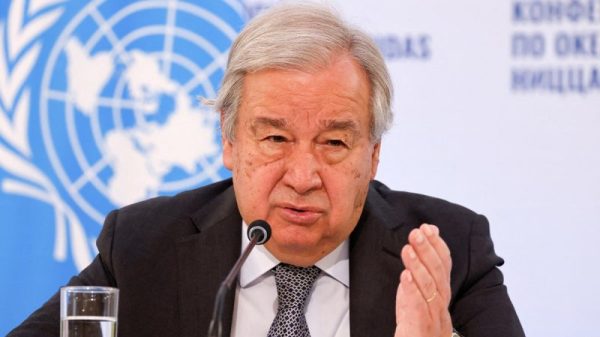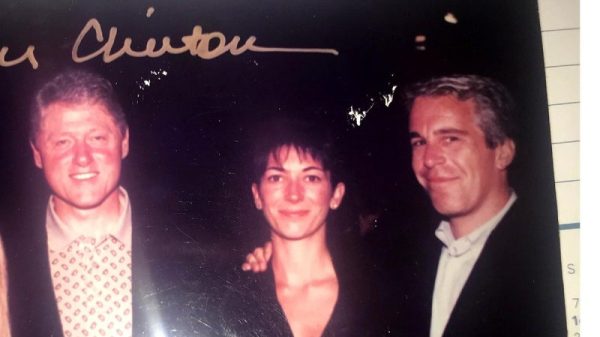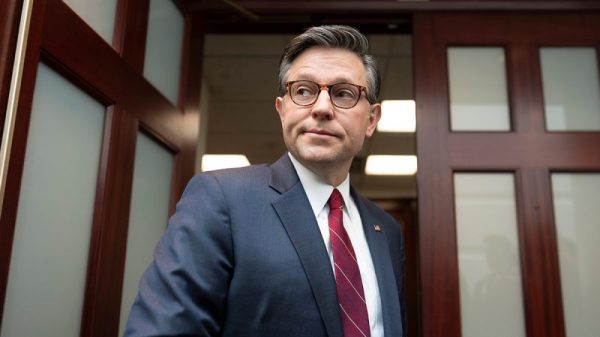On Monday, first lady Jill Biden revealed this year’s White House holiday decorations. Among them is the focal point of the Blue Room: the floor-to-ceiling Fraser fir Christmas tree.
The tradition that began with President William Howard Taft’s children dropping a tree into the Blue Room in 1912 has become a carefully orchestrated search for a tree that must be the right height and should be strong enough to hold up thousands of ornaments. Once selected, a team of White House staff and volunteers stand on scaffolding wrapping lights and hanging handmade ornaments and ribbons before the first family takes an exclusive peek. Hundreds of gallons of water keep the tree fresh and exuding the scent of Christmas.
The hunt for the Blue Room Christmas tree begins at the farm.
In October, like every fall, a White House delegation traveled to the winner’s farm to pick the tree that will temporarily replace the chandelier in the Blue Room, an oval parlor used for receptions and small dinners.
This year, the White House team went to Fleetwood, N.C., where it closely inspected and measured six trees grown by siblings Amber Scott and Alex Church, the winners of this year’s Grand Champion Grower contest. The National Christmas Tree Association, a trade industry that promotes the use of real pines, has run the contest since the 1960s. The winner donates a Christmas tree to be placed in the Blue Room, and the runner-up tree traditionally stands at the vice president’s home. To qualify for the national contest, growers must first win a state or regional competition.
The White House team had seen pictures of the six trees that met the criteria before arriving at Cline Church Nursery, a 500-acre family-owned tree farm that has sat in the heart of the Blue Ridge Mountains since 1977. But there’s nothing like seeing the trees in person, said Tim O’ Connor, executive director of the National Christmas Tree Association.
“It’s a little bit of a beauty contest,” said O’Connor, who has presented trees to the Obamas, Trumps and Bidens. “They have to be perfect. They are in the center of the room, so you can’t hide the bad side in the corner like you do at home sometimes.”
Proportions are important. The tree can’t be too wide or too narrow. If you’re able to see through it, it’s probably not Blue Room material. The tree’s branches must also be sturdy enough to hold as many as 3,000 ornaments.
The bar for the Blue Room Christmas tree is high — literally. The tree must be 18½ feet tall to fit inside the Blue Room once its chandelier comes down. The height is nonnegotiable because once the chandelier is put away, the tree uses its power source. A potential Blue Room tree, which can take up to 24 years to grow, must have a diameter of nearly 12 feet so it can be the center of the room with enough wiggle room to keep some furniture, depending on the administration.
“It has to be a very symmetrical tree and very full,” said Laura Dowling, a White House chief floral designer during the Obama administration.
In 2010, Dowling traveled with a White House delegation to a farm in Lehighton, Pa., to select that year’s Blue Room tree.
“I remember the horticulturist testing the branches to make sure that the needles were very strong.” Dowling said. “What I was looking for was: ‘Would it be a good tree to decorate?’”
Dowling recounted walking around the farm for hours to find the best pine. The scent, she said, is “very important.”
“I’ve never heard of a time when a first lady didn’t approve the tree that we selected,” Dowling said. “Whether it was the first lady or a guest who arrived, the minute they went into the Blue Room, the tree made a statement.”
After Taft’s children placed the first tree in the Blue Room while their parents were in Panama, other first families followed. Some placed a small tree in the Blue Room; others preferred a large tree or trees in the East Room, where most of the holiday festivities took place.
During the Eisenhower administration, first lady Mamie Eisenhower featured a tree in the Blue Room consistently, the White House Historical Association wrote. First lady Jacqueline Kennedy continued this tradition and in 1961 selected a theme for the annual Blue Room Christmas tree: the “Nutcracker” ballet. This tradition of a themed Blue Room Christmas tree has continued ever since.
The tree is usually delivered to the White House before Thanksgiving. And like everything that enters the White House, it must have security clearance and be fully inspected before a team of about eight to 10 National Park Service workers lift it, carry it through the North Portico and place it in the Blue Room. (How a tree that tall is screened remains a secret, a matter of national security, of course.)
In 2018, first Lady Melania Trump skipped the unveiling of the annual White House Christmas decorations “to let the decorations speak for themselves,” her spokeswoman Stephanie Grisham told reporters at the time.
That year, the first lady raised eyebrows with red Christmas trees made of berries. Her office said “the choice of red is an extension of the pales, or stripes found in the presidential seal designed by our Founding Fathers.”
(The Blue Room tree should not be confused with the White House’s National Christmas Tree, which towers nearly 47 feet tall outside the White House.)
In 2014, Dowling recounted, the tree was so large and fluffy that the main door of the White House had to be temporarily removed for it to fit. Once placed inside the Blue Room, the tree, which arrives bundled up, is opened and left to rest for a couple of hours or overnight before the magic begins, she said.
Once the tree has opened its branches, electricians string thousands of lights onto the pine.
Then the fun part begins.
Volunteers and White House staffers carefully dress it with handmade ribbons and ornaments that sit in a White House warehouse for most of the year. The shiniest ornaments are placed deep within the tree to give the illusion of more lights than it has.
Once the holiday season comes to an end, like everything that goes up, the tree must come down.
“The White House decorations go into storage and go back up every year,” Dowling said.
And about 10 months later it all begins again at a farm.
On Monday, first lady Jill Biden revealed this year’s White House holiday decorations. Among them is the focal point of the Blue Room: the floor-to-ceiling Fraser fir Christmas tree.
The tradition that began with President William Howard Taft’s children dropping a tree into the Blue Room in 1912 has become a carefully orchestrated search for a tree that must be the right height and should be strong enough to hold up thousands of ornaments. Once selected, a team of White House staff and volunteers stand on scaffolding wrapping lights and hanging handmade ornaments and ribbons before the first family takes an exclusive peek. Hundreds of gallons of water keep the tree fresh and exuding the scent of Christmas.
The hunt for the Blue Room Christmas tree begins at the farm.
In October, like every fall, a White House delegation traveled to the winner’s farm to pick the tree that will temporarily replace the chandelier in the Blue Room, an oval parlor used for receptions and small dinners.
This year, the White House team went to Fleetwood, N.C., where it closely inspected and measured six trees grown by siblings Amber Scott and Alex Church, the winners of this year’s Grand Champion Grower contest. The National Christmas Tree Association, a trade industry that promotes the use of real pines, has run the contest since the 1960s. The winner donates a Christmas tree to be placed in the Blue Room, and the runner-up tree traditionally stands at the vice president’s home. To qualify for the national contest, growers must first win a state or regional competition.
The White House team had seen pictures of the six trees that met the criteria before arriving at Cline Church Nursery, a 500-acre family-owned tree farm that has sat in the heart of the Blue Ridge Mountains since 1977. But there’s nothing like seeing the trees in person, said Tim O’ Connor, executive director of the National Christmas Tree Association.
“It’s a little bit of a beauty contest,” said O’Connor, who has presented trees to the Obamas, Trumps and Bidens. “They have to be perfect. They are in the center of the room, so you can’t hide the bad side in the corner like you do at home sometimes.”
Proportions are important. The tree can’t be too wide or too narrow. If you’re able to see through it, it’s probably not Blue Room material. The tree’s branches must also be sturdy enough to hold as many as 3,000 ornaments.
The bar for the Blue Room Christmas tree is high — literally. The tree must be 18½ feet tall to fit inside the Blue Room once its chandelier comes down. The height is nonnegotiable because once the chandelier is put away, the tree uses its power source. A potential Blue Room tree, which can take up to 24 years to grow, must have a diameter of nearly 12 feet so it can be the center of the room with enough wiggle room to keep some furniture, depending on the administration.
“It has to be a very symmetrical tree and very full,” said Laura Dowling, a White House chief floral designer during the Obama administration.
In 2010, Dowling traveled with a White House delegation to a farm in Lehighton, Pa., to select that year’s Blue Room tree.
“I remember the horticulturist testing the branches to make sure that the needles were very strong.” Dowling said. “What I was looking for was: ‘Would it be a good tree to decorate?’”
Dowling recounted walking around the farm for hours to find the best pine. The scent, she said, is “very important.”
“I’ve never heard of a time when a first lady didn’t approve the tree that we selected,” Dowling said. “Whether it was the first lady or a guest who arrived, the minute they went into the Blue Room, the tree made a statement.”
After Taft’s children placed the first tree in the Blue Room while their parents were in Panama, other first families followed. Some placed a small tree in the Blue Room; others preferred a large tree or trees in the East Room, where most of the holiday festivities took place.
During the Eisenhower administration, first lady Mamie Eisenhower featured a tree in the Blue Room consistently, the White House Historical Association wrote. First lady Jacqueline Kennedy continued this tradition and in 1961 selected a theme for the annual Blue Room Christmas tree: the “Nutcracker” ballet. This tradition of a themed Blue Room Christmas tree has continued ever since.
The tree is usually delivered to the White House before Thanksgiving. And like everything that enters the White House, it must have security clearance and be fully inspected before a team of about eight to 10 National Park Service workers lift it, carry it through the North Portico and place it in the Blue Room. (How a tree that tall is screened remains a secret, a matter of national security, of course.)
In 2018, first Lady Melania Trump skipped the unveiling of the annual White House Christmas decorations “to let the decorations speak for themselves,” her spokeswoman Stephanie Grisham told reporters at the time.
That year, the first lady raised eyebrows with red Christmas trees made of berries. Her office said “the choice of red is an extension of the pales, or stripes found in the presidential seal designed by our Founding Fathers.”
(The Blue Room tree should not be confused with the White House’s National Christmas Tree, which towers nearly 47 feet tall outside the White House.)
In 2014, Dowling recounted, the tree was so large and fluffy that the main door of the White House had to be temporarily removed for it to fit. Once placed inside the Blue Room, the tree, which arrives bundled up, is opened and left to rest for a couple of hours or overnight before the magic begins, she said.
Once the tree has opened its branches, electricians string thousands of lights onto the pine.
Then the fun part begins.
Volunteers and White House staffers carefully dress it with handmade ribbons and ornaments that sit in a White House warehouse for most of the year. The shiniest ornaments are placed deep within the tree to give the illusion of more lights than it has.
Once the holiday season comes to an end, like everything that goes up, the tree must come down.
“The White House decorations go into storage and go back up every year,” Dowling said.
And about 10 months later it all begins again at a farm.





















